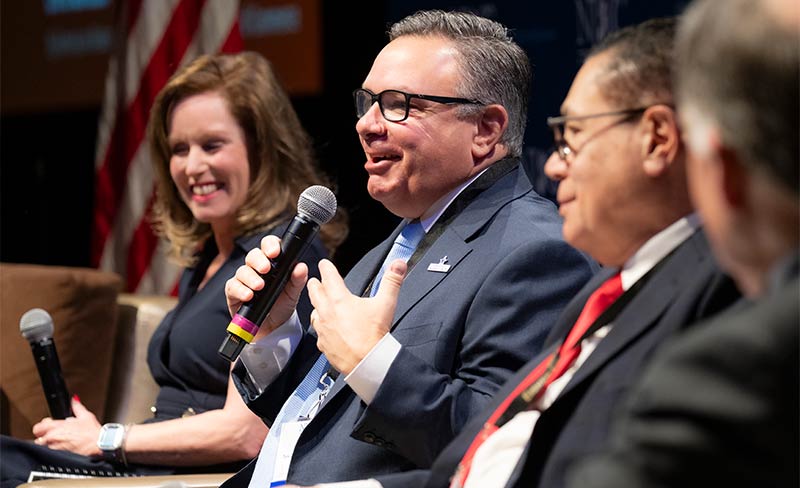But state officials are keeping close tabs on potential impact that major stock losses, ongoing effects of coronavirus outbreak could have on tax collections
A tumultuous week on Wall Street and the continued worsening of the coronavirus outbreak has so far not precipitated any major revisions to New Jersey Department of Treasury economic forecasts.
At least for now, Treasury officials are sticking with budget projections issued late last month that foresaw steady growth in tax collections in both the near term and lasting through the middle of 2021.
However, officials are keeping close tabs on both the financial markets, where stocks were suffering their biggest losses in decades this week, and the ongoing effects of the outbreak of the coronavirus, or COVID-19, which has infected dozens of New Jersey residents in recent weeks. State Treasurer Elizabeth Maher Muoio is expected to give a detailed revenue update when she appears before lawmakers in both the Senate and Assembly this spring.
“As always, Treasury is continuously monitoring the stock market and economic conditions, taking into account any potential impact COVID-19 may have on tax revenues,” Muoio said in a statement Thursday.
Treasury released the most recent state economic projections late last month as Gov. Phil Murphy unveiled his budget plan for fiscal year 2021. At the time, the state’s tax-collection forecast for the remaining months of FY2020, which closes at the end of June, was upgraded by about $1 billion. In fact, Treasury upgraded the forecasts for the state’s top three sources of revenue — the income, sales and corporate-business taxes — at the end of February.
In addition, the administration’s current revenue forecast for FY2021 points to another net increase in tax collections of nearly $1.7 billion through the end of June 2021. While the governor is seeking a series of proposed tax-policy changes as part of his overall $40.85 billion budget plan, which would generate about $1 billion of that planned year-over-year boost, another roughly $700 million is projected to come from normal economic growth under most current tax rates. (The FY2021 projections do account for a continued reduction of a surcharge on top-earning corporations that Murphy and lawmakers enacted in 2018.)
Wall Street unrest
However, those optimistic forecasts from Treasury were issued before stocks tumbled dramatically in the wake of the growing coronavirus outbreak, which has now infected 29 New Jersey residents and caused one fatality, as of the most recent official update from the Murphy administration.
Major sporting events and other activities have also been put on hold across the state and in other parts of the country as health officials urge caution to prevent further spreading of the disease, with Murphy issuing a new advisory Thursday that urges against public gatherings of more than 250 people.
The latest market unrest and ongoing developments related to COVID-19 come as lawmakers are in the middle of a lengthy public-hearing process that culminates in late June with the adoption of an appropriations bill. In fact, during a hearing Thursday at Rowan University, Michael Egenton of the New Jersey Chamber of Commerce urged lawmakers to be mindful of businesses that are struggling to “adapt and comply with the ongoing situation and what that may inevitably mean to their viability and bottom line.”
“This is critically important as the state Legislature crafts a final state budget that must take into account the fiscal implications of this health-care crisis,” Egenton said.
Low unemployment, decent GDP growth
If New Jersey is heading into a potential economic downturn, it will do so from a strong starting position, including steady low unemployment and decent near-term gross-domestic product growth. But the New Jersey Constitution does not allow the state budget to operate with a deficit, so any big drops in revenue or even forecasted shortfalls must bring on spending cuts or other budget adjustments to keep things in balance.
The first signs of trouble typically show up in tax-collection reports that Treasury issues on a monthly basis, although some tax sources are reported with a lag.
Muoio said in her statement that any impact on state tax collections would be “predicated on the length and depth of any change in economic activity.”
“We will continue to provide monthly public revenue updates and I will be providing detailed revenue updates to the Senate and Assembly budget committees over the next several months,” she said.
New Jersey last experienced a major drop in revenues in 2014, when state tax collections were on course to come up about $1 billion short of projections before then-Gov. Chris Christie took action to rebalance spending, largely by reducing planned contributions into the public-employee pension system. That shortfall was blamed on the impact of a “fiscal cliff” caused by federal tax-policy changes in 2012.
Great Recession’s major impact
The Great Recession of 2007-2009 also took a major toll on the New Jersey budget, causing then-Gov. Jon Corzine to slash year-over-year state spending by nearly $4 billion and use some $2 billion in federal stimulus aid to help prevent more drastic cuts. Corzine also enacted temporary tax increases on high earners, including a true millionaires tax, which Murphy is now seeking to establish on a permanent basis in his FY2021 budget plan.
In addition, in just one year, the Corzine administration had to use up more than $700 million that had been socked away in the state’s Surplus Revenue Fund, a statutory lockbox commonly referred to as the “rainy day fund” that can generally be tapped only during emergencies.
Last year, the Murphy administration made a $401 million deposit into the emergency fund, the first such deposit since it was drained during the Great Recession. Other state budget reserves were also padded in the FY2020 budget, leaving the state with a cushion of nearly $1.3 billion, or just over 3% of total spending. Reserves would increase to $1.63 billion, or 4% of total spending, under Murphy’s budget plan for FY2021.





